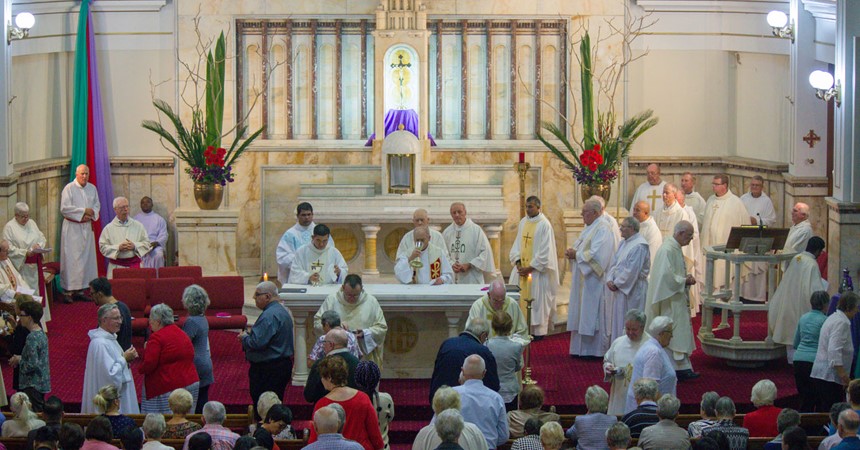This confluence of significant experiences leads me to reflect on Eucharist, by which I mean the celebration of Eucharist (Mass). We refer to it as the source and summit of Christian life, (LG a. 11) and the centre of our whole liturgical life from which we the faithful derive the true Christian spirit. (cf. CSL 5, 14)
It is most appropriate then that the ‘Worship and Prayer’ paper (p.15) from the Synod states that, we the people, have identified a need to deepen our understanding of the Eucharist. Such deepening is a lifelong journey because the Eucharist is a mystery and will always be beyond any understanding we have at any given moment. As Fr Richard Lennan reflected at the end of the second session of the Synod, the Holy Spirit prompts movement and the sign that we have heard the Spirit is that we move.
Our inability to gather to celebrate Eucharist for much of last year pushed us, arguably more than any experience since the Second Vatican Council, to reflect more deeply on the mystery of the Eucharist.
At that time, the Diocesan Liturgy Council and Office prepared and pointed to a range of resources that invite us to reflect more deeply on the nature, purpose and meaning of Eucharist in our lives.
To be honest, the Diocesan Liturgy Council and Office have been encouraging us to deepen our understanding of Eucharist for years: to treat Eucharist as the source and summit, and with the other Sacraments, as the centre of the church’s entire liturgical life (LG a. 6), rather than as the only liturgy in the Catholic Church’s repertoire. We have been encouraging the community to respect that, as our most sacred action, it is a celebration of the faithful. It requires faith and a desire for conversion. (CSL a. 9)
While a deeper understanding is important, it is not the end point. Our deeper understanding needs to find expression in the celebration of the Eucharist. It is the liturgy, not our understandings, which most deeply forms us, as week by week we keep learning together to ‘put on the mind of Christ’, to be ‘clothed in Christ’, to ‘pattern our lives on the Gospel’. The celebration of the Eucharist is the privileged place where we learn to offer ourselves with Christ, surrendering ourselves to God to be taken, blessed, broken open and poured out for the life of the world.
To join the community for the celebration of Eucharist is to live dangerously. It requires that we participate, fully, consciously and actively, as celebrants NOT consumers. I invite you to revisit the resource the Liturgy Council and Office prepared last year Celebrants or Consumers? It matters! If our celebration of the Eucharist, most particularly on Sunday, is to embody our deepest understanding at this moment, then you and I have to change the way we participate. The work of building the Kingdom of God together depends on it.
It is equally important that we ensure we initiate children and their parents, and adults into such an active, participatory appreciation of Eucharist as the source of our life as a community of missionary disciples.
Last year when Bishop Bill suspended the celebration of the Sacraments of Initiation and asked communities to take time to reflect on their current practice, the Liturgy Council and Office prepared a resource to assist parishes with this reflection. ‘Sacraments of Initiation Fallow Year Resource’ We asked parishes to share it widely given that responsibility for Christian Initiation lies with the whole community.
In light of Sunday’s celebration of the feast of the Body and Blood of Christ and that First Communion is coming up in most parishes, I invite you to consider part of the Introductory Reflection to the section on First Communion from this Fallow Year Resource. I think it has something to offer as we seek to deepen our understanding and celebration of Eucharist. (Fallow Year Resource p. 46)
First Communion is the culmination of the process of Christian Initiation.
This fallow time provides the parish community, particularly ministers of Christian Initiation, with an opportunity to reflect deeply on the nature and purpose of Eucharist in the life and mission of the Church. How does the process of preparation and celebration of First Communion initiate families into a rich appreciation of Eucharist and not a private, devotional understanding that presents Eucharist as an object rather than a communal action – as a noun rather than a verb.
… Much of our current reflection has focused on whether we understand ourselves as celebrants or consumers of Eucharist. Are we coming to Mass to get a commodity? Or are we coming to do and become something together?
Using this image invites us to consider many things such as:
- How are we initiating people into an appreciation of the integral connection between Eucharist and life? How are we helping them to know that we come to the celebration of Eucharist with our hands and hearts full of the joys and sorrows of our lives and the world, ready to hand these to our God of love and mercy, who receives us and embraces us as we are, and shapes us to be sent out to be a sacrament of love for the world?
- How are we opening people’s minds and hearts to appreciate that in the presentation of bread and wine we place our lives on the altar so that joined to Christ, God will take, bless, break and give us for the life of the world?
- How are we initiating children and families into an appreciation of Communion as a communal action rather than a private action? Are we encouraging people to watch the Communion Procession attentive to their brothers and sisters with whom we share this meal?
- How are we opening people’s hearts to experience Christ’s paschal – dying, rising – rhythm in the liturgy, so that they will recognise it in their lives and our world and so have hope even in the darkest of places?
- How are we helping people appreciate what a dangerous word ‘Amen’ is?
Central to these questions is our understanding of the Vatican II catchcry, ‘full, conscious and active participation’. How are we helping people appreciate that participation is something the whole assembly does together (the presider is part of the assembly)? How are we helping families appreciate the three levels of liturgical participation?
- Participating in the liturgical action via responding, listening, singing, movement …
- Participating in the paschal mystery by joining ourselves to Christ’s dying and rising action, offering ourselves to be taken, blessed. broken and given for the life of the world …
- Participating in the very life of God …
Are we initiating people as celebrants or consumers? Which mode is essential to lifelong discipleship?
The faith of the Church is that Eucharist makes the church. Bread and wine are changed AND so are we, not only as disciples, but most significantly as a community who is responsible for the continuation of Jesus’ mission in the world today.
What ponderings are you bringing to your reflection on our pastoral practice relating to the preparation and celebration of First Communion?
Let’s begin by acknowledging that we hand ourselves to God … to shape us and shepherd us … The hymn ‘Shepherd me O God’ helps us to reflect how this is working in our own lives. You might like to listen to the psalm version of that hymn here.
I don’t know about you, but my understanding and appreciation of Eucharist is stretched most profoundly by people I know who ‘live Eucharist in daily life’; people who surrender themselves to the daily pattern of being taken, blessed broken open and given by God in love for others. Fr Paul O’Neill has been one of those people for many of us. He died as he lived, surrendering himself gracefully to the dying, rising pattern of Christian life. I found the readings he chose for his Funeral Mass are a great meditation on the meaning of Eucharist, that ‘when lived daily and celebrated in the liturgy … is the living symbol of Christ’s life’. Paul was such a living symbol of Christ’s life – of a wide, inclusive love poured out for others.
It is dangerous to put anything on paper when reflecting on such a profound mystery and so I am conscious that this reflection lacks so much. Hopefully it invites you into your own journey of reflection, an ever-deepening understanding of Eucharist and to a changed manner of participation in our celebration of Eucharist. The world needs us to do this work!
Abbreviations
LG Lumen Gentium – Dogmatic Constitution on the Church. Vatican Council II
CSL - Constitution on the Sacred Liturgy. Vatican Council II
Acknowledgements
Image: The Catholic Diocese of Maitland-Newcastle. All rights reserved.
The Scripture quotations contained herein are from The Jerusalem Bible © 1966 by Darton, Longman & Todd Ltd and Doubleday and Company Ltd, and are used by permission of the publishers.

